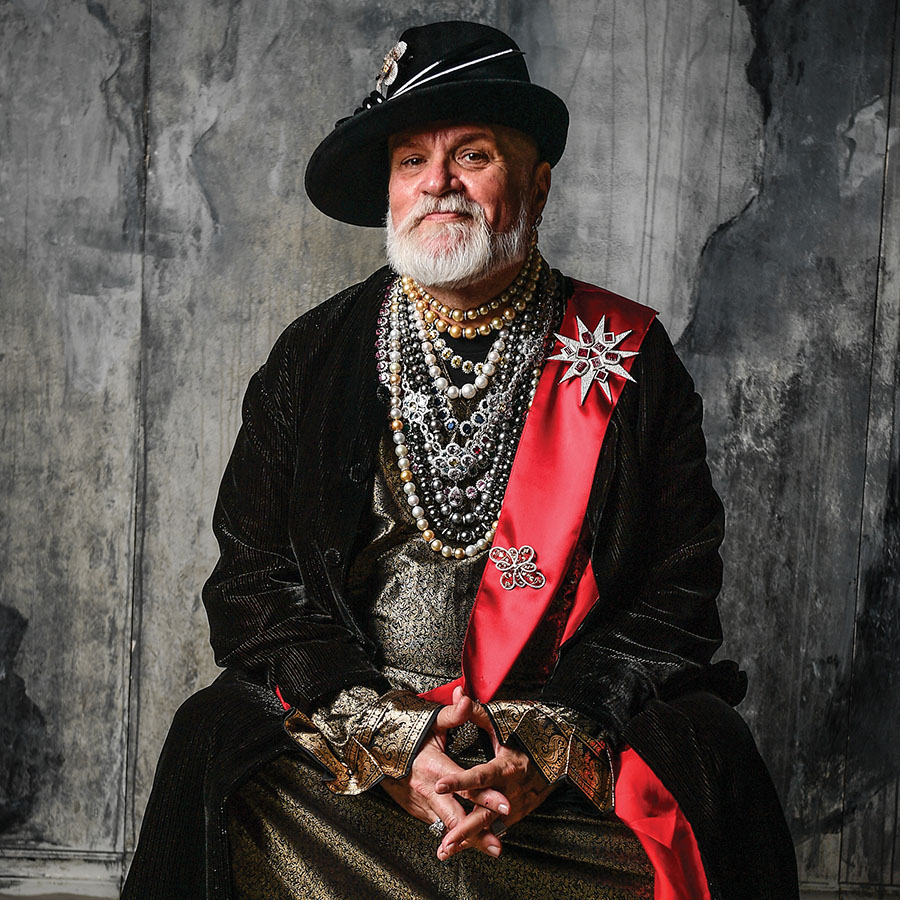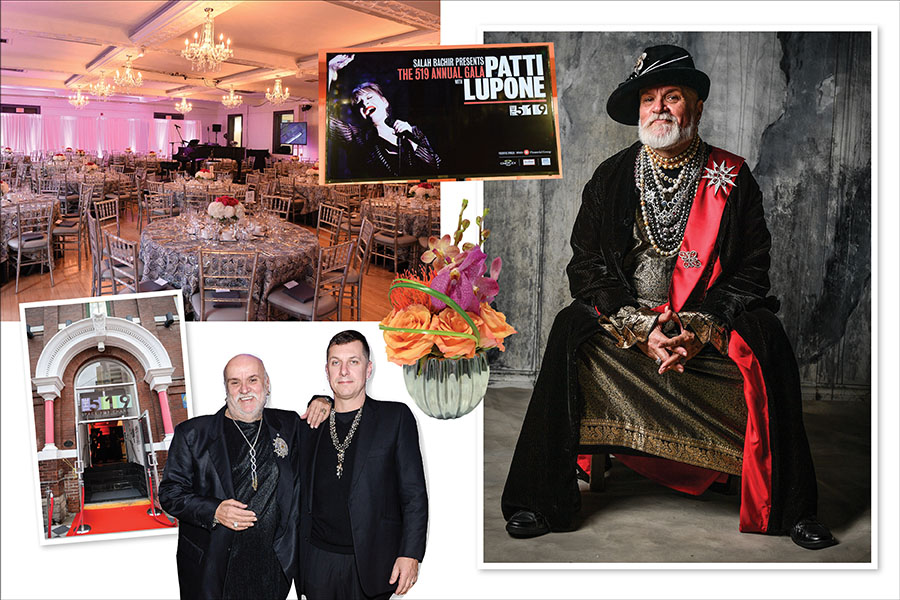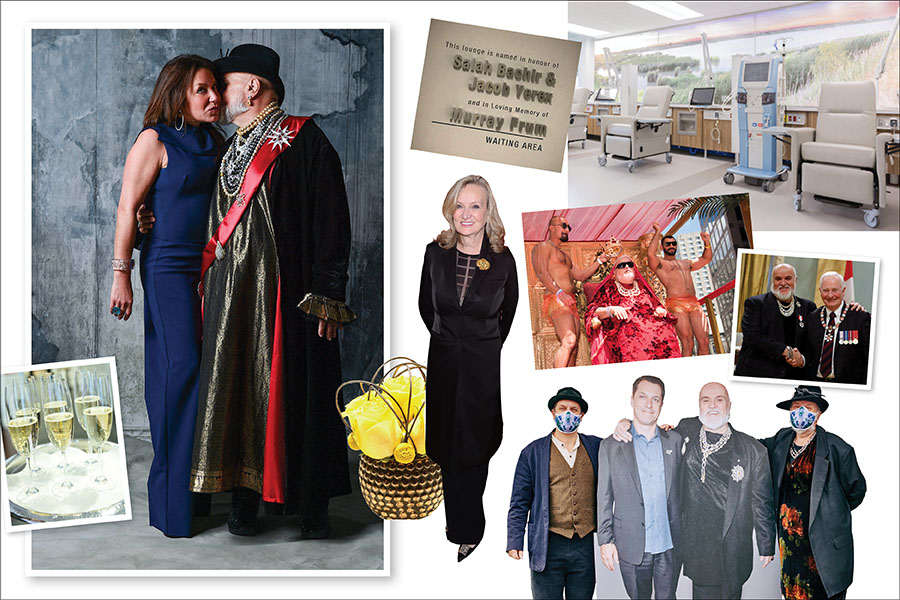The Salah Effect: How Salah Bachir Harnessed a Passion for Social Justice and Became a Master of the Fundraiser

Salah Bachir, seen here at the 2019 CAFA Awards, spoke with Zoomer about his penchant for throwing the perfect fundraising gala and how it grew out of his passion for activism and social justice. Photo: George Pimentel
To celebrate Pride Month 2021, we profile the life of Canadian entrepreneur and champion fundraiser Salah Bachir, whose decades-long commitment to LGBTQ causes remains at the heart of his philanthropic legacy.
When Salah Bachir threw himself a 65th birthday bash last October, it was a virtual celebration to put all other COVID-19 birthday bashes to shame. Instead of the requisite Zoom call, which would have required several computer screens to view his legion of friends, family and beneficiaries, the Toronto philanthropist saw an opportunity to do what he does best.
He combined the party with the annual fundraiser he organizes for The 519, a Toronto organization that supports the LGBTQ community. Then Bachir, The 519’s honorary patron, exponentially amped up the entertainment factor. Attendees were treated to a private digital extravaganza with messages from Elton John and his husband, producer David Furnish, Margaret Atwood, the Barenaked Ladies and Andrea Martin, not to mention performances by a lineup of legends including k.d. lang, Patti Lupone, Carole Pope, Ben Vereen and Alan Cumming. By the end of the night, the president emeritus of Cineplex Media had raised $500,000 for The 519, which supports some of Toronto’s most vulnerable and marginalized residents. Although Bachir retired last year, he’s still an executive consultant for Cineplex as well as the president and CEO of Phamous Characters, a sponsorship, branding and events company he has run for four decades.
The 519’s executive director, Maura Lawless, says Bachir’s birthday fundraiser was their “largest and most successful” annual event ever, but his sprawling network of deep pockets has a lasting legacy as well. “The other kind of intangible element is that through his involvement, corporate partners and other philanthropic supporters have developed longer-term deeper relationships” with the centre.

Affectionately dubbed Gala Salah for his larger-than-life-of-the-party presence on Canada’s schmancy rubber-chicken dinner circuit, Bachir recently told his Instagram followers he’s more than happy to stay home these days.
“For the record, I do not miss dressing up for parties,” he wrote on Feb. 24, posting a picture taken two years ago at an Oscar party in L.A. where he is decked out in the eye-popping jewelry he favours — usually an extravagance of pearls but, in this case, a blingy three-strand necklace, a massive lapel brooch and an armful of sparkly bracelets.
That diamond-studded Oscar party picture was taken just months before he had several surgeries “and had to relearn how to walk three different times,” the kidney-transplant recipient wrote. “And I am alive. So in perspective, every day is better than the last.”
Everyone who has worked with Bachir on myriad fundraisers going back to the 1980s knows he has a few edicts, including “We should all be having more fun,” says Nancy Lockhart, who met him in the early ’90s when they both sat on the Canadian Film Centre board. They are dear friends to this day; Bachir and his husband, artist Jacob Yerex, offered unwavering support when her husband, real estate developer, art collector and philanthropist Murray Frum, died in 2013. When it comes to galas, she knows where Bachir stands. “Speeches can be boring as hell. You’ve paid the money and then you get punished. Salah is about bringing on the entertainment.” Every colleague interviewed for this story shared Bachir’s golden rule of galas: “No live auctions! Never a live auction!”
Bachir was born in Lebanon and emigrated to Canada in 1965 with his family when he was 10, where they settled in Rexdale, a northwestern Toronto neighbourhood.
“I grew up playing hockey and lacrosse,” he says. “I still watch the NFL religiously. People have trouble reconciling that with the guy who wears pearls. Well, jewelry makes the man, I always say.” And how did he discover his signature accessory? “[The late arts patron] Bluma Appel invited me to a lunch where all the ladies were wearing pearls,” he says. “The next lunch, I wore my pearls, too. I told them I wanted to fit in!”
Fitting in versus standing out has been part of the narrative tension of Bachir’s life since the family immigrated to Canada. In Rexdale in the ’60s, “There were two WASPs between the Greeks, Italians, Yugoslavs and us, the Lebanese. My mother broke barriers, taking stuff from her garden back and forth to the neighbours.” One of his earliest memories is from Lebanon, when his mother and grandmother would give food to those who had none.
“I remember my grandmother baking pita bread and telling me someone needed it more.”
Bachir’s passion for social justice is deep-rooted. His father was a union man, and he grew up going to the Labour Day parade. “Watching the Vietnam War on TV, the assassination of MLK, that shocked you awake.” When Bachir was 15, he stood outside the Dominion grocery store in the Rexdale Plaza to raise money for U.S. labour leader and civil rights activist Cesar Chavez, who was making an appearance in Toronto near the end of the Delano grape boycott to protest the exploitation of California farm workers. “It’s kind of funny because I love grapes,” Bachir says. He collected about $150, and $50 of that came from his dad. “I gave it to Chavez shyly. He told me how much $25 would mean to a family of migrant workers. And he told me something I will never forget: he said that the money I gave him was $150 more than the cause had that morning.” Bachir remembers bemused parents of his friends bringing him cookies whenever he was protesting outside the Dominion, whether he was boycotting produce or calling attention to native rights, South African apartheid activist Steve Biko’s assassination or the testing of American cruise missiles over Canada. “My mother was relieved when I was going out somewhere else rather than to stand in front of the grocery store where she shopped.”
But it was his student days at Waterloo University — where he studied history and political science — that reinforced how food can unite people for the greater good. After he and fellow Marxist-curious students occupied the student newspaper for nine months. When the administration “closed it without due process,” Bachir joined the International Students’ Association. “We threw potluck suppers to gather votes,” he says. “It taught me you can break a lot of barriers through food. You can build support for things, find kinship. You disarm people — they feel better having eaten something.”

His commitment to LGBTQ causes is close to his heart. As an Arab son, he struggled as a closeted gay man. When he came out to his father when he was about 30, his dad asked if his mother knew. “I said I had already told her,” Bachir says. “So my father then goes, ‘Wait, I thought I was your best friend!’”
He was reticent to come out to work colleagues and his sports pals but recalls his relief at a Super Bowl party he threw in that era. A friend, sensing his nervousness, said, “Sal, come on, I know you are gay. No straight guy ever catered a Super Bowl party from Fenton’s,” referring to the long-shuttered, swanky Toronto restaurant beloved by the upper crust for its leek and Stilton soup.
Bachir, a man of entrepreneurial verve, watched his brother open a video store and decided to start a trade magazine when he saw an opportunity. He added on a video trade show, then video awards galas. He worked with Universal and Disney on home video releases, eventually joining forces with Famous Players, which merged with Cineplex. His innovation, according to Marketing magazine, was to revolutionize and legitimize the in-cinema business, building blockbuster ads with clients and inserting a few powerful social justice-themed public service announcements (including the time in 2005 when he got death threats for an ad that read: “‘I do’ means the same whether you are straight or gay. Let your MP know you support our Charter of Rights and Freedoms”). He also launched the Scene loyalty program and Cineplex magazine. “We don’t go in for celebrity gossip,” he says, citing the secret of his publishing success.
His health issues with kidney disease led to a longtime association with another beneficiary of his charitable giving, St. Joseph’s Health Centre. While receiving dialysis at one of its clinics, he decided patients needed a serene space. He wanted to raise money and raise it fast, so he got on his phone and organized the Non-Gala Gala in 2013.
“Don’t buy a dress. Don’t get a sitter. Don’t pay for parking. Don’t have a bad meal,” he said in an email to a vast network of contacts from his gilded Rolodex. “Just send me the money.”
That effort netted $250,000, which was used to spruce up the hospital’s dialysis and chemotherapy clinics and buy TVs to help patients occupy the time as they spent hours each week hooked up to the machines that clean toxins from their blood. He later upped the ante, raising $2.5 million for entirely new clinics. Bachir, whose kidney transplant occurred in 2019, has had dialysis “all over the world” and thus is especially proud of the Bachir Yerex Family Dialysis Clinic at Toronto’s St. Joseph’s Renal Centre. The couple has even donated some of their art collection to adorn the beautiful new space.
The list of causes Bachir has thrown himself into is long and always personally meaningful. He is a founding member of the Canadian Foundation for AIDS Research (CANFAR) and raised money for Casey House – Canada’s only freestanding hospital for HIV/AIDS patients – as well as the LGBTQ Inside Out film festival, the Canadian Film Centre, the Art Gallery of Ontario and the Ontario College of Art and Design University, where he is the chancellor.
He threw a Wild Bird Ball for the Pelee Island Bird Observatory and, in 2016, he served as Grand Marshal of the Pride Parade, surrounded on the float by men in gold bikinis. He received the Variety Club Heart award in 1996, the Canadian Centre for Diversity Human Relations Award in 2012, the Order of Canada in 2017 and the Order of Ontario in 2020. Of these last two honours, which come with a lapel pin, he quips, “I learned that if you wear brooches” – he does, as often as possible, original commissions – “the pin goes over the brooch.”
Bachir and Yerex usually live in a condo overlooking Toronto’s waterfront, where 3,000 works of stellar art surround them, including deep dives into the portfolios of Attila Richard Lukacs, Betty Goodwin, Stephen Andrews and an array of some 60 Warhols.
He and Yerex and their Havanese dog, Max, have been dividing their time during the pandemic between their condo and their country house in Paris, Ont., once owned by the town’s mayor. Built in 1842, Alexander Graham Bell was a guest, “though you’d think the phone would work better than it does out here, with that pedigree,” Bachir jokes.
Bachir is endearingly direct in all his communication, his friends report. Andy Pringle, a friend since the early 2000s, relates his fearlessness around what fundraisers call “making the ask.” Pringle, a former bond trader and current chair of the board of CANFAR who is married to journalist Valerie Pringle, recalls visiting Bachir in hospital after one of his surgeries. “Jacob said to me, ‘I wonder which of you will hit the other up for money [for a cause] first?’ I won because Salah was flat on his back.”
Kate Alexander Daniels produced The 519 gala last year alongside Bachir. “Underneath the jewels and sparkle and shine and glamour that appears to you is actually an extremely humble, decent, authentic, loving warrior who will stop at nothing to do what’s right for the causes that he looks at and sees need help,” says the philanthropist and president of the strategic communications and production company Daniels/O’Hagan/Stephenson.
That said, Alexander Daniels says Bachir “is tough as nails.” The two have worked on event productions since the late ’90s at the CFC and later on AGO gala productions and the Governor General Arts Awards in Ottawa. “Salah takes no prisoners, nor does he have to. He is so fiercely intelligent, strategic, accomplished and capable.”
From his new stay-at-home life, Bachir steps up where he is needed, segueing seamlessly from a video forum on diversity with an MPP to a board meeting to a sponsorship negotiation. Does he ever get flummoxed by the sheer number of his charitable commitments? “Of course I get overwhelmed. That’s what all those friends are for,” he says, “and I know to ask for help.” In the end, he’s still that kid protesting outside the Dominion in Rexdale. “If there is something I can do and I’m not doing it, I get angry and frustrated.”
A version this article appeared in the April/May 2021 issue with the headline “The Salah Effect,” p. 67.
RELATED:
Salah Bachir Says Thank You To Friends
‘Judy’: Beyond This Grammy Nominated Film’s Rainbow is a Wider Complexity of Queer Culture